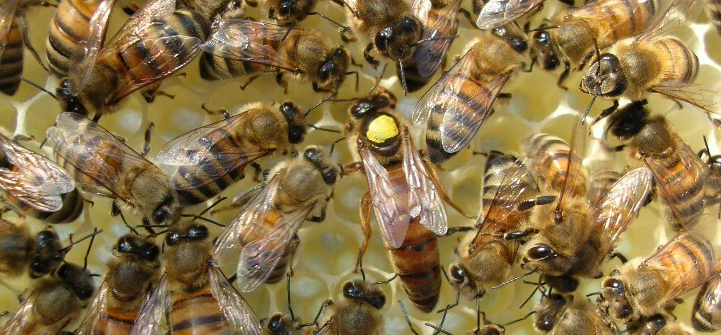UMass Extension Symposium: Pollinator Health for Agriculture and Landscapes
March 26, 2015
Campus Center Auditorium, University of Massachusetts, Amherst
8:00 AM Registration and Coffee
8:45 AM Welcome, Anne Averill, Dept. of Environmental Conservation, UMass
9:00 – 10:00 AM Biology, Diversity and Conservation of Native Bees in the Northeast, Joan Milam, Department of Environmental Conservation, UMass
Pollinators are key elements of native biodiversity, and bees in particular provide important ecosystem services in terms of pollination for native plants that support plant and wildlife diversity. Not only are bees important pollinators of natural systems, they are responsible for the pollination of the fruits, nuts and vegetables grown in the United States. This talk will cover bee basics: what makes a bee a bee, the great diversity of bee species, and what we can do to help conserve native bees.
10:00 – 10:45 AM The Natural History and Ecology of Honey bees in Our Landscapes, Dr. Frank Drummond, School of Biology and Ecology, University of Maine
Honey bees are amazing animals. They are one of the few insects that have been domesticated by humans, but they still remain somewhat wild. Dr. Drummond will take a look at the history of honey bees in the U.S. up to the 1960s and then how changes occurred through the present that have determined the current honey bee status and health.
10:45 – 11:00 AM Break
11:00 – 11:45 AM How Healthy are the Bees? Dr. Frank Drummond, School of Biology and Ecology, University of Maine
We have all heard about CCD, colony collapse, bee decline, a new silent spring…so, the question is how is the honey bee doing AND also the hundreds of species that are referred to as native bees? Dr. Drummond will discuss bee health…what is meant by “health”…what do scientists know about bee “health” and what is the global picture that is beginning to form about bee health. Dr. Drummond will attempt to provide background knowledge for better understanding several of the other talks in this conference about what we can DO about bee declines.
11:45 – 1:00 Lunch on your own – Many options on main floor of campus center Take time to view exhibits
1:00 – 2:00 Designing Pollinator Support Plantings: Think Like a Bee Dr. Lois Berg Stack, University of Maine, Northern New England Pollinator Habitat Working Group
Dr. Berg Stack will help us to think like a bee when designing pollinator support plantings. Effective pollinator support plantings provide flower resources, nest sites and water. Good site assessment allows for the selection of plants that complement existing resources, and good process can produce an effective long-term resource that requires limited maintenance.
2:00 – 2:10 Break
2:10 – 3:00 PM Neonicotinoids in Agriculture and Landscapes: Do They Harm Honey Bees or Native Bees? Dr. Kim Stoner, The Connecticut Agricultural Experiment Station
For 10 years, controversy has been swirling around the possible effects of neonicotinoids on bees. Dr. Stoner will talk about what we have learned and what we still don’t know about routes by which bees could be exposed to these systemic insecticides and how bee health may be affected.
3:00 – 4:00 PM Creating a Bee-friendly Landscape: Protecting Bees from Pesticide Exposure Dr. Anne Averill, Department of Environmental Conservation, UMass
In addition to the neonicotinoids, what are the different classes of pesticides, what are their risks to pollinators, how do they interact with other stressors, and how can pollinators be protected from exposure? Guidelines on how to best manage pests while reducing the hazard to bees will be covered. Bees require an extensive safe landscape, so Dr. Averill will also address how to grow flowering plants that are safe in our yards. She will conclude with a broad look of how national and international programs address pollinator health and safety.
4 Pesticide Credits have been approved in all categories.
For more information about the program contact: Tina Smith, Univ. of Mass, Amherst 413-545-5306, tsmith@umext.umass.edu or Ellen Weeks, Univ. of Mass, Amherst, 413-545-2685, eweeks@umext.umass.edu
Pollinator Health for Agriculture and Landscapes Registration Deadline – March 21, 2015
All Names
Firm
Address
Email address
Telephone
One Registration x $65.00/person = _________Total Amount
Discount for Two or More Registrations from Same Business
___________No. Registrations (2 or more) x $40.00/person = _________Total Amount
Registration includes coffee, parking pass & handouts
Make check payable to: University of Massachusetts
Return to: Attn: Ellen Weeks, Agriculture & Landscape Program
French Hall, 230 Stockbridge Rd., University of Massachusetts, Amherst MA 01003
United States Department of Agriculture cooperating. An Equal Opportunity Employer and Program Pro
